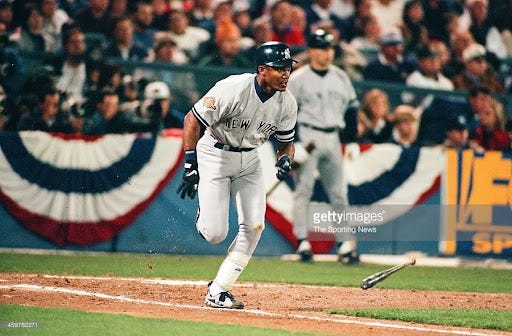Mariano Duncan: part of the D.R.'s championship baseball legacy
From helping at the fruit stand to hearing cheers from the grandstand. Our latest "Tough Outs" story
Mariano Duncan grew up in Angelina, a sugar mill town near San Pedro de Macorís in the Dominican Republic, surrounded by struggle and ambition. He was one of eleven children in a family that struggled with financial security. His father, Enrique, had lost a limb while working in the cane fields, forcing the family to find alternative ways to survive. His mother, Nilda, worked tirelessly to support their family by selling fruits, vegetables, and poultry at the local market.
Baseball served as an escape from suffering. Duncan and his buddies, like many other young players in the Dominican Republic, used improvised equipment such as tree branch bats, cardboard scrap gloves, and rolled-up sock balls. Baseball was more just a game, it was a chance, a route out. Duncan aspired to play on the grandest platform, inspired by local giants like César Cedeño who had overcome similar challenges.
Duncan took a risk by dropping out of school at the age of 15 to pursue his passion for baseball. His initial audition with the Los Angeles Dodgers was unsuccessful. Instead of giving up, he pushed himself to improve his talents with Baterías Meteoro, a strong amateur team in Santo Domingo. His perseverance paid off when the Dodgers recognized his ability and signed him in 1982 for $5,000.
Challenging himself in the face of adversity
Adjusting to professional baseball proved to be more difficult than he imagined. After moving to North America, he experienced culture shock, homesickness, and the harsh demands of the lower levels. While playing for the Lethbridge Dodgers, doubts crept in. Far from his family and suffering with the shift, he considered returning home. Instead, he opted to fight and embrace the discomfort and the ability to thrive under pressure. His resilience became his defining characteristic.
Duncan made his major league debut with the Los Angeles Dodgers in 1985, kicking off a 12-season career spanning five teams. Versatility became his trademark. He played both second base and shortstop, always bringing an unrivaled intensity to the game. His debut season, which included 38 stolen bases and a third-place finish in debut of the Year voting, set the tone for his career.
Leaving his mark across both leagues
His most notable contributions came in 1990, with the Cincinnati Reds. He played an important part as the team's spark plug, helping the Reds win their first World Series championship in 14 years. He was known for his aggressive base running and ability to generate momentum. He became an important part of the teams' success.
In 1994, Duncan achieved the pinnacle of his solo performance. While with the Philadelphia Phillies, he batted .318 and was selected to the All-Star team. More than just statistics, he established himself as a clubhouse leader, encouraging colleagues to compete with intensity and determination. Wherever he played, he was the type of player who inspired others around him.
Retirement did not imply a departure from the game. Duncan moved easily into coaching, devoting his post-playing career to mentoring the next generation. In 2001, he established a baseball academy in the Dominican Republic, investing in emerging talent in the same way that others had previously invested in him. His influence grew beyond the Dominican Republic, with coaching positions with the Los Angeles Dodgers, the Chicago Cubs' minor league system, and, finally, the New York Mets organization.
As of 2024, he was the bench coach for the Binghamton Rumble Ponies, the Mets' Double-A affiliate. His work is a continuation of his playing career, teaching young athletes the value of discipline, hard work, and resilience. Duncan's Journey from a Sugar Mill Town to Major League Baseball and beyond is about endurance. He didn't just play the game, he lived it, motivating those who followed in his footsteps.



